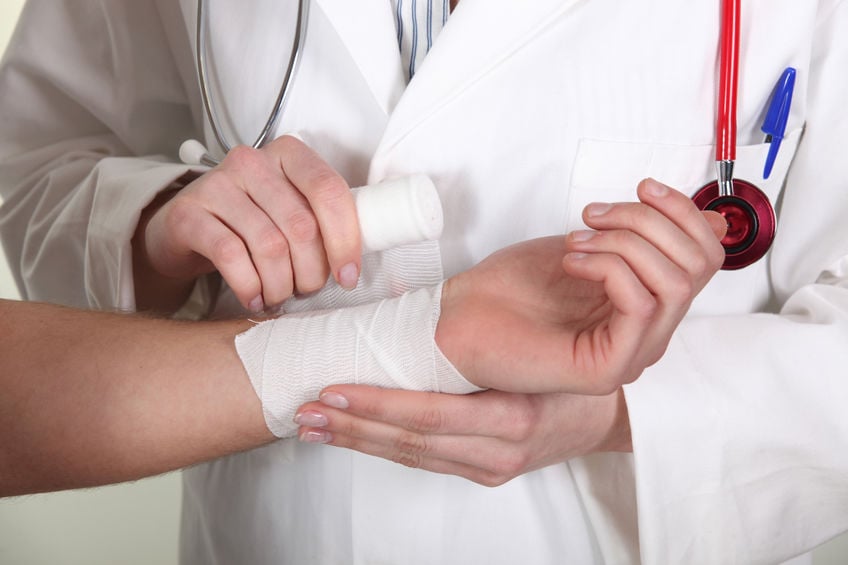
Burn injuries are a leading cause of accidental death across the entire nation. Serious burns (called third-degree burns) can be deadly, and less serious burns can still cause permanent damage. So, what should you do if you’ve been burned? Let us from Lerner and Rowe Injury Attorneys go over the proper medical and legal steps.
How to Care for Your Burn
First, different types of burns:
Types of Burns
- Thermal burns occur from flames or hot objects.
- Chemical burns occur from caustic or corrosive chemicals.
- Scalds occur from hot liquids or steam.
- Electrical burns occur from charged metals and wiring.
- Inhalation burns occur from breathing in smoke.
Depending on the type of burn, the damage could vary. There are three separate severities of burns:
Severities of Burns
- First-degree burns are the least severe burns. These burns penetrate only the first layer of skin and are identified by pain, redness, minor swelling, and the absence of blisters.Usually, they do not require medical treatment
- Second-degree burns are more severe than first-degree burns. These burns affect the layer under the skin called the dermis and cause pain, redness, swelling, and blistering. Some types of second-degree burns require medical attention, but not always.
- Third- and fourth-degree burns are the most serious kinds of burns. These burns make the skin leathery and waxy. The skin changes to a whitish or blackish color, indicating permanent charring of the deepest layers of the skin. Damage from these burns is usually irreparable. Burns of this severity require serious medical treatments.
Steps to Care for Burns
- For all burns, stop the burning immediately. Cease contact with whatever is causing the burn, whether it’s flaming material or a piping hot liquid. If flames are involved, stop, drop, and roll, and remove smoldering material. Take off any clothes that are on fire or burned. You should remove jewelry from affected areas, as burns can quickly swell up.
- For first-degree burns, use cool (not cold) water to soothe the burn. If running water is unavailable, use a compress. Cover the burn with a non-adhesive bandage or clean cloth. Do not use ointments. Take over-the-counter pain relievers such as Ibuprofen, Tylenol, or Aleve. If the pain worsens, swelling gets larger, or you notice signs of infection, see a doctor.
- For second-degree burns, use cool (not cold) water to soothe the burn for 10 to 15 minutes. Never use ice. If you notice blisters, do not break them. Cover loosely with a sterile bandage and tape, and do not use ointments. To prevent shock, lay down flat and elevate your feet about 12 inches. Then, keep the affected area above your heart level. Wrap yourself in a coat or blanket to keep warm and stabilize your nervous system. You should take over-the-counter pain relievers and see a doctor for further treatment.
- For third- and fourth-degree burns, immediately call 911. Do not soak the affected area in water, and do not use ice. Cover the burn with a sterile, non-adhesive bandage or cloth, without using ointments. As is the case with second-degree burns, third- and fourth-degree burn treatment requires that you lay flat, elevate the feet and affected area, and keep warm to prevent shock. You should immediately seek medical attention after such a serious burn.
What Legal Action Can You Take?
So, what are the legal steps you can take after your burn injuries? Here are the basics:
Negligence
One of the most crucial elements in a burn injury case is the proving of negligence. Negligence is essentially the careless act of another that caused you injury. For negligence to be present, the following must be proven:
- The defendant had a duty of care to protect the plaintiff;
- The defendant breached their duty of care;
- That breach caused the plaintiff’s injury; and
- The injury resulted in damages.
Going to Trial
Once you decide to go to trial, there are a few things you should keep in mind.
- Statute of Limitations – In Nevada, you have two years after the burn injury to file a lawsuit.
- Who is liable – You should consider who may be responsible for your burn. Was it a reckless employee? Could it have been the employer or manager of an establishment? Contact Lerner and Rowe for a free consultation.
- Recoverable Damages – Your compensation can vary depending on how serious the burn is. You can get compensation for pain and suffering, medical expenses, loss of income, loss of enjoyment of life, rehabilitation, and more.
Contact a Lawyer
You should always contact a personal injury lawyer after a serious burn injury. Personal injury lawyers are well versed in dealing with burn injury cases, and they can help get you compensation for your suffering.
Suffer from Burn Injuries in Las Vegas?
If you suffer from personal injury, contact Lerner and Rowe Injury Attorneys today! Our experienced professionals work tirelessly to get you the compensation you deserve. Our office is open from Monday to Friday, 8 a.m. to 5 p.m. Feel free to call us anytime at (844) 977-1900, or you can fill out an online contact form and check out our LiveChat feature.
Consultations are absolutely free. We do not collect any fees whatsoever unless we win your case. So, don’t wait; call Lerner and Rowe today!
The information on this blog is for general information purposes only. Nothing herein should be taken as legal advice for any individual case or situation. This information is not intended to create, and receipt or viewing does not constitute, an attorney-client relationship.



